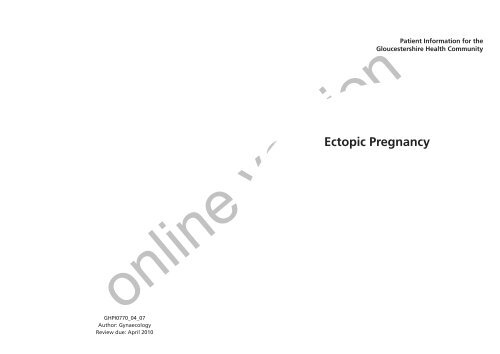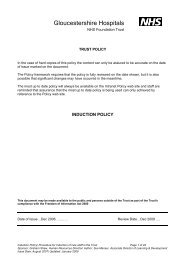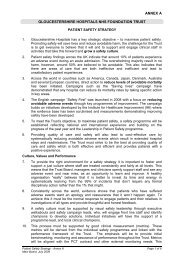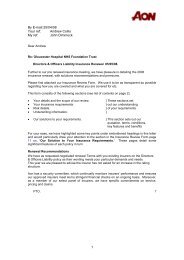Online Version - Gloucestershire Hospitals NHS Trust
Online Version - Gloucestershire Hospitals NHS Trust
Online Version - Gloucestershire Hospitals NHS Trust
You also want an ePaper? Increase the reach of your titles
YUMPU automatically turns print PDFs into web optimized ePapers that Google loves.
GHPI0770_04_07<br />
Author: Gynaecology<br />
Review due: April 2010<br />
online version<br />
Patient Information for the<br />
<strong>Gloucestershire</strong> Health Community<br />
Ectopic Pregnancy
What about returning to work or normal<br />
activities?<br />
You will need possibly up to 4- 6 weeks to recuperate after surgery.<br />
It is advisable to build up your strength gradually. Having an ectopic<br />
pregnancy can be traumatic because you are dealing with the loss of<br />
a pregnancy as well as trying to recover from emergency surgery. It<br />
is common to feel anxious or depressed for a while after treatment.<br />
Worries about possible future ectopic pregnancy, the affect on fertility,<br />
and sadness over the loss of the pregnancy are normal. Do talk with a<br />
doctor about these and any other concerns following treatment.<br />
If you would like any further information, or would like to talk<br />
to someone who has been through the experience of an ectopic<br />
pregnancy, please contact :<br />
The Miscarriage Association<br />
C/O Clayton Hospital<br />
Northgate<br />
Wakefield<br />
Yorkshire<br />
WF1 3JS<br />
Tel : 01924 200799<br />
The Ectopic Pregnancy <strong>Trust</strong><br />
Maternity Unit<br />
Hillingdon Hospital<br />
Pield Heath Road<br />
Uxbridge<br />
Middlesex<br />
UB8 3NN<br />
Tel : 01895 238035<br />
online version<br />
5
do not need an operation. The disadvantage is that you will need close<br />
observation for several weeks with repeated blood tests to check it has<br />
worked. Also, side-effects affect some women. If this treatment is not<br />
successful, further surgery to remove the tube may be necessary.<br />
• Expectancy (‘wait and see’). Some ectopic pregnancies that have<br />
not ruptured clear without treatment. The pregnancy often dies<br />
in a way similar to a miscarriage. A possible option is to ‘see<br />
how things go’ if you have mild or no symptoms. You can have<br />
treatment if symptoms become worse. However, a ‘wait and see’<br />
approach is not often advised. This is because there is a chance of<br />
a sudden rupture of the fallopian tube. This will need emergency<br />
surgery. Also, you will need close observation and repeated scans<br />
and blood tests to check on how things are developing.<br />
You may experience some bleeding for few days after surgery/medical<br />
treatment, due to the fact that you have been pregnant and the<br />
lining of the womb has thickened. The above is a brief description of<br />
treatment options. A gynaecologist will advise on the pros and cons of<br />
each treatment.<br />
What about future pregnancy?<br />
Although you may want to try again, it is best to wait until you<br />
and your partner are ready, both physically and emotionally. It is<br />
advisable to wait until 4-6 weeks after surgery before resuming sexual<br />
intercourse. If you have had medical treatment, your doctor will advise<br />
you accordingly. If one tube was removed, you will continue to ovulate<br />
as before but your chances of conceiving may be reduced, this varies<br />
with each individual, One common question is “what is the chance of<br />
having a future normal pregnancy after an ectopic pregnancy?” Even<br />
if one fallopian tube is removed, you have about a 7 in 10 chance<br />
of having a future normal pregnancy. (The other fallopian tube will<br />
still usually work.) There is also a 1 in 10 chance of a repeat ectopic<br />
pregnancy. Hence as soon as you suspect you are pregnant, you<br />
must contact your GP immediately and be monitored closely. Once<br />
the ectopic pregnancy has been excluded, the pregnancy would be<br />
anticipated to continue normally and no further close monitoring<br />
would be required.<br />
What is an Ectopic Pregnancy?<br />
An ectopic pregnancy is where the fertilised egg implants outside the<br />
uterus(womb), most commonly in the fallopian tube(the tube that<br />
connects the ovary to the uterus). Rarely an ectopic pregnancy can<br />
occur in the ovary, cervix or abdominal cavity. It usually occurs in the<br />
first ten weeks of pregnancy.<br />
About 1in 100-200 pregnancies in United Kingdom are ectopic, but<br />
this figure rises to 5 in 100 after assisted conception therapies and to<br />
20-30 in 100 after tubal damage due to infection or tubal surgery.<br />
What are the possible causes of an ectopic<br />
pregnancy?<br />
The chances of having an ectopic pregnancy can be increased by the<br />
following:<br />
1. Tubal damage from pelvic infection, endometriosis or appendicitis<br />
2. Women who have had previous abdominal surgery ( scar tissue<br />
and adhesions develop)<br />
3. Women using the IUCD(coil) as a contraceptive and become<br />
pregnant are at risk, though a pregnancy is very rare<br />
4. In most cases the cause of the pregnancy developing outside the<br />
uterus is never discovered<br />
What are the symptoms of an ectopic<br />
pregnancy?<br />
Symptoms typically develop around the 6th week of pregnancy. This<br />
is about 2 weeks after a missed period if you have regular periods.<br />
However, symptoms may develop anytime between 4 and 10 weeks of<br />
pregnancy. You may not be aware that you are pregnant. For example,<br />
your periods may not be regular, or you may be using contraception<br />
and not realise it has failed. Also, symptoms may start about the time<br />
a period is due. At first you may think the symptoms are just a late<br />
period. Symptoms include one or more of the following.<br />
online version<br />
4<br />
1
• Pain on one side of the lower abdomen. It may develop sharply, or<br />
may slowly get worse over several days. It can become severe.<br />
• Vaginal bleeding often occurs, but not always. It is often different<br />
to the bleeding of a period. For example, the bleeding may be<br />
heavier or lighter than a normal period. The blood may look<br />
darker. However, you may think the bleeding is a late period.<br />
• Other symptoms may occur such as diarrhoea, feeling faint, or<br />
pain on passing faeces (stools).<br />
• Shoulder-tip pain may develop. This is due to some blood leaking<br />
into the abdomen and irritating the diaphragm (the muscle used<br />
to breathe).<br />
• If the fallopian tube ruptures and causes internal bleeding, you<br />
may develop severe pain or ‘collapse’. This is an emergency as the<br />
bleeding is heavy.<br />
• Sometimes there are no warning symptoms (such as pain)<br />
before the tube ruptures. Therefore ‘collapse’ due to sudden<br />
heavy internal bleeding is sometimes the first sign of an ectopic<br />
pregnancy.<br />
How is an ectopic pregnancy confirmed?<br />
If you have symptoms that may indicate an ectopic pregnancy you will<br />
be sent to hospital immediately.<br />
• A urine test can confirm that you are pregnant.<br />
• An ultrasound scan may confirm an ectopic pregnancy. However,<br />
the scan may not be clear if the pregnancy is very early. A few<br />
days of observation may be needed if symptoms are not severe. A<br />
repeat scan a few days later may clarify the site of the pregnancy.<br />
• Blood tests that show changes in the pregnancy hormones are<br />
also helpful.<br />
• A look inside the abdomen with a special telescope (laparoscopy)<br />
is sometimes advised to confirm an ectopic pregnancy.<br />
If the ultrasound shows an empty uterus, but the pregnancy test is<br />
positive, an ectopic pregnancy is possible, although you may have had<br />
a miscarriage.<br />
2<br />
It is not always possible to see an ectopic pregnancy on ultrasound<br />
scan and if you feel well, you will have some blood taken to measure<br />
the pregnancy hormone level and this will be repeated over the next 2<br />
days to confirm the diagnosis.<br />
What are the treatment options for ectopic<br />
pregnancy?<br />
Ruptured ectopic pregnancy<br />
Emergency surgery is needed if a fallopian tube ruptures with heavy<br />
bleeding. The main aim is to stop the bleeding. The ruptured fallopian<br />
tube and remnant of the early pregnancy are then removed. The<br />
operation is often life saving.<br />
Early ectopic pregnancy - before rupture<br />
Ectopic pregnancy is often diagnosed before rupture. Your doctor will<br />
advise on the treatment options, which may include the following.<br />
Surgery.<br />
A planned operation is the usual treatment. Removal of the tube and<br />
the ectopic pregnancy is the traditional treatment. More recently,<br />
better surgical techniques mean that it is sometimes possible to<br />
preserve the fallopian tube. Operations by ‘keyhole surgery’ are<br />
becoming more popular.<br />
• Laparoscopy - insertion of scope(camera) into the abdomen<br />
through your navel (‘key hole surgery’)<br />
• Laparotomy - incision (open cut) into the abdominal cavity<br />
• Salpingectomy - removal of the fallopian tube<br />
online version<br />
• Salpingotomy - cut open the tube and removing the ectopic<br />
pregnancy alone ( preserving the tube )<br />
Medical treatment.<br />
A medicine called methotrexate may be an option. It works by killing<br />
the cells of the pregnancy growing in the fallopian tube. It is normally<br />
only advised if the pregnancy is very early. The advantage is that you<br />
3
















